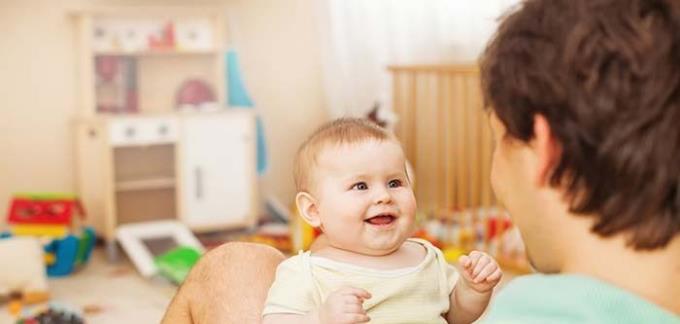Ways to determine an infants caloric needs

Learn how to determine your baby’s caloric needs, including the calories in breast milk and formula, to ensure your infant gets the right nutrition for healthy growth.
A smiling baby is also a time when you have a memorable moment in your life as a parent. Children's smile is also an important milestone in visual and brain development.
In fact, babies can laugh long before they are born. However, this smile is not intentionally or stimulated by any factor, but merely a reflex of the body.
The first smile contains many meanings about the baby's development. These are signs that your baby's vision has improved and that your baby is able to recognize your face. Your baby's brain and nervous system have also matured to dismiss smiles reflexively. By this time, she learns that smiling is a way to interact with people.
Babies also begin to realize that their emotions affect everyone. Children will smile to express joy, excitement, contentment and happiness. Here is a way for your baby to say, "I'm taking good care of me" or "The milk is gone, I want to drink more". The meaning of babies being able to laugh is indeed very important.
A reflex smile will disappear before your baby is 2 months old and a real smile will appear when your baby is about 1.5 to 3 months (6 to 12 weeks). You can distinguish a smile on a reflex from a real smile based on when and how long it was when your baby laughed.
In general, reflex smiles often happen randomly, when babies sleep or are tired and are usually quite short. Real smiles only appear when your baby reacts to something, such as seeing your face or hearing a loved one's voice. If it is a real smile, you will see the baby's feelings through the eyes.

If you are still waiting to see your baby's smile, encourage your baby with actions such as talking to him often, making eye contact and smiling throughout the day. Talking with your baby regularly also brings many benefits for your baby's language development in the future.
You can also create a funny face, imitate the sounds, actions of an animal, peek with your baby ... However, do not overdo it. Infants are developing their own emotional regulation, if they are overly stimulated there will be a negative effect.
When you know how to smile, your baby will laugh many times. When your baby smiles at you, his eyes will light up, you will play peek with him and return his smile. This will make the baby feel excited. Initially, your baby will use his smile to respond to both visual and sound stimuli. So your baby often laughs when he hears you sing or talks to him while changing diapers.
After your baby's vision has developed, just seeing the faces of the people he loves, he will laugh. When she gets used to laughing, she begins to make sounds. At first it was just hums, then there would be giggles. By 5 months, your baby will surprise you with loud laughter and screams when excited.
When you see your baby does not smile, you do not need to worry too much because this does not mean that the baby is unhappy or there is something unusual. Each baby will reach this milestone at different times, and some will need a few more weeks.
At 3 months, your baby needs to communicate with you or other caregivers and strangers with eyes and sound (eg making a noise protesting against you pulling the baby out of the bottle or breast). However, if your baby still does not have these symptoms until 3 months, you should take him to see a doctor.
Learn how to determine your baby’s caloric needs, including the calories in breast milk and formula, to ensure your infant gets the right nutrition for healthy growth.
Discover the top 5 smartest dog breeds in the world, including Border Collie, Poodle, German Shepherd, Golden Retriever, and Doberman Pinscher. Learn about their unique traits and why they are considered the most intelligent dogs.
Discover 7 nutritious and delicious ways to cook egg porridge for babies, including recipes with cheese, pumpkin, tomato, and more. Learn how to prepare baby-friendly egg porridge with our expert tips.
After a series of medical measures they obtained a complete human vascular system profile.
Watermelon is one of the fruits that many people love, not only cheap but also delicious, nutritious and refreshing in the summer. To get delicious watermelon pieces, show off your housewives, your artistic talents to cut beautiful pieces of watermelon.
aFamilyToday Health - The digestive system and body in each baby is different. Parents need to recognize notes to deal with when babies have a food allergy!
Babies need many factors for perfect development. aFamilyToday Health shares with parents things to keep in mind when babies are 8 weeks old so that parents can take care of their babies the best!
Babies need many factors for perfect development. aFamilyToday Health shares with parents things to keep in mind when babies are 18 weeks so that parents can take care of their babies the best!
Babies need many factors for perfect development. aFamilyToday Health shares with parents things to keep in mind when babies are 28 weeks old so that parents can take care of their babies the best!
Babies need many factors for perfect development. aFamilyToday Health shares with parents things to keep in mind when babies are 32 weeks old so that parents can take care of their babies the best!








